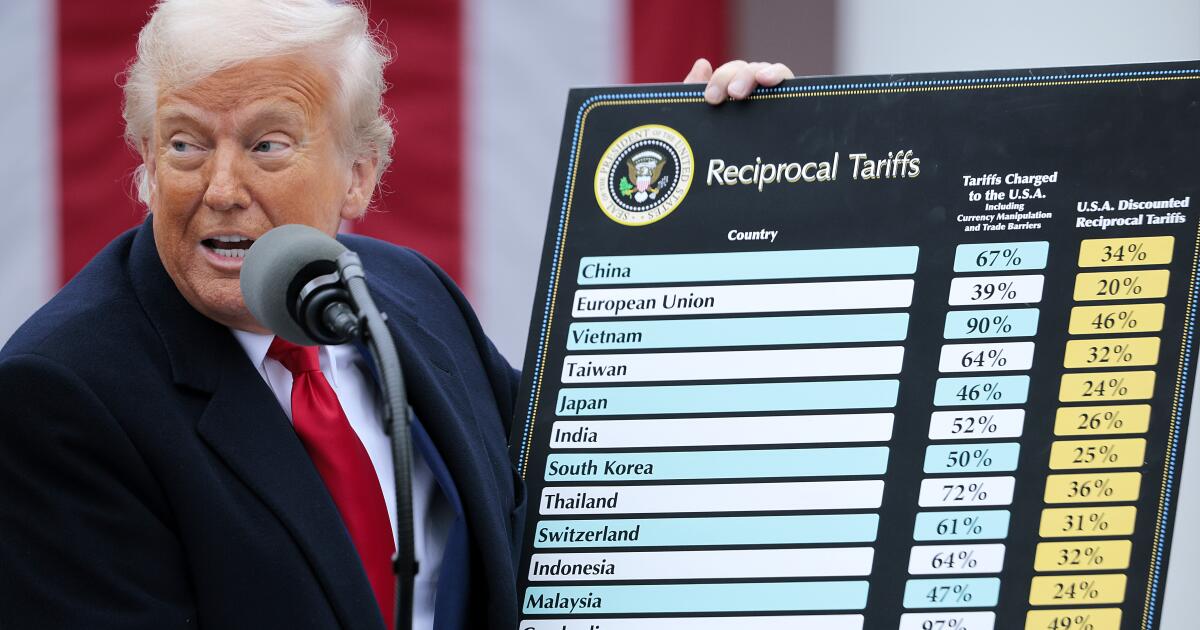WASHINGTON — President Trump has asked the Supreme Court for a fast-tracking ruling that he has broad power acting on his own to impose tariffs on products coming from countries around the world.
Despite losing in the lower courts, Trump and his lawyers have reason to believe they can win in the Supreme Court. The six conservative justices believe in strong presidential power, particularly in the area of foreign policy and national security.
In a three-page appeal filed Wednesday evening, they proposed the court decide by Wednesday to grant review and to hear arguments in early November.
They said the lower court setbacks, unless quickly reversed, “gravely undermine the President’s ability to conduct real-world diplomacy and his ability to protect the national security and economy of the United States.”
They cited Treasury Secretary Scott Bessent’s warning about the potential for economic disruption if the court does not act soon.
“Delaying a ruling until June 26 could result in a scenario in which $750 billion-$1 trillion have already been collected and unwinding them could cause significant disruption.” he wrote.
Trump and his tariffs ran into three strong arguments in the lower courts.
First, the Constitution says Congress, not the president, has the power “to lay and collect Taxes, Duties, Imposts and Excises” and a tariff is an import tax.
Second, the 1977 emergency powers law that Trump relies on does not mention tariffs, taxes or duties, and no previous president has used it to impose tariffs.
And third, the Supreme Court has frowned on recent presidents who relied on old laws to justify bold new costly regulations.
So far, however, the so-called “major questions” doctrine has been used to restrict Democratic presidents, not Republicans.
Three years ago, the court’s conservative majority struck down a major climate change regulation proposed by Presidents Obama and Biden that could have transformed the electric power industry on the grounds it was not clearly based on the Clean Air Acts of the 1970s.
Two years ago, the court by the same 6-3 vote struck down Biden’s plan to forgive hundreds of millions of dollars in student loans. Congress had said the Education Department may “waive or modify” monthly loan payments during a national emergency like the Covid 19 pandemic, but it did not say the loans may be forgiven, the court said. Its opinion noted the “staggering” cost could be more than $500 billion.
The impact of Trump’s tariffs figure to be at least five times greater, a federal appeals court said last week in ruling them illegal.
By a 7-4 vote, the federal circuit court cited all three arguments in ruling Trump had exceeded his legal authority.
“We conclude Congress, in enacting the International Emergency Economic Powers Act, did not give the president wide-ranging authority to impose tariffs,” they said.
But the outcome was not a total loss for Trump. The appellate judges put their decision on hold until the Supreme Court rules. That means Trump’s tariffs are likely to remain in effect for many months.
Trump’s lawyers were heartened by the dissent written by Judge Richard Taranto and joined by other others.
He argued that presidents are understood to have extra power when confronted with foreign threats to the nation’s security.
He called the 1977 law “an eyes-open congressional grant of broad emergency authority in this foreign-affairs realm” that said the president may “regulate” the “importation” of dangerous products including drugs coming into this country.
Citing other laws from that era, he said Congress understood that tariffs and duties are a “common tool of import regulation.”
